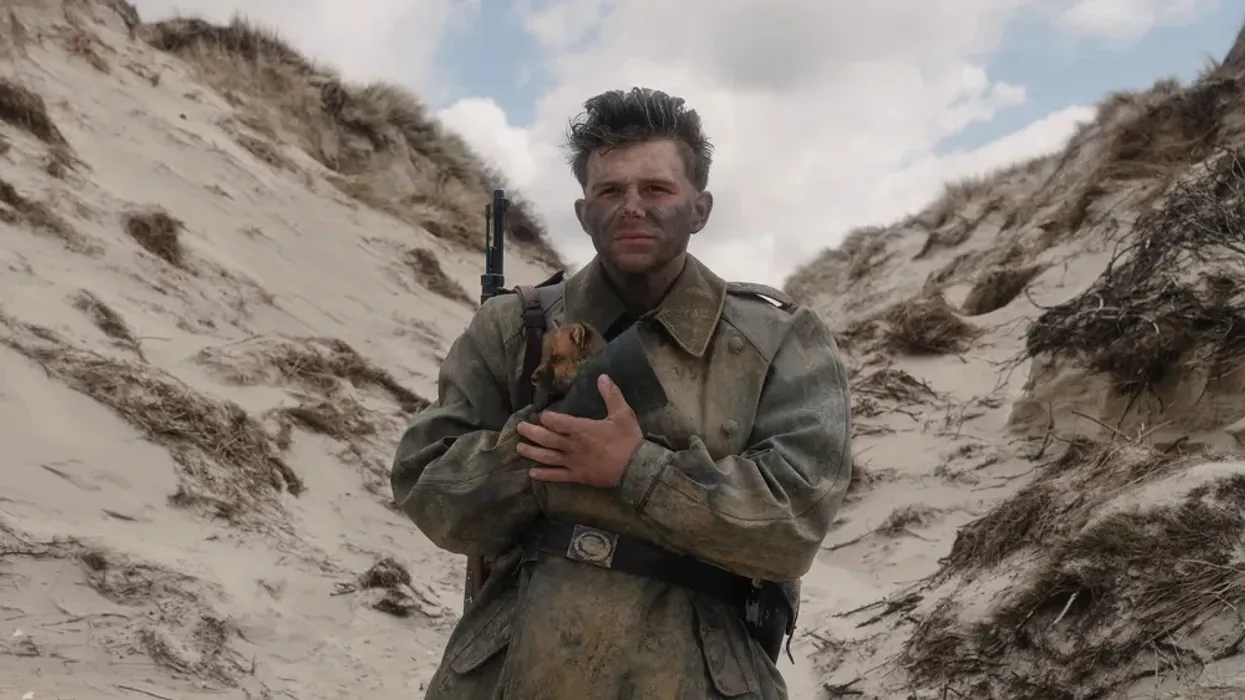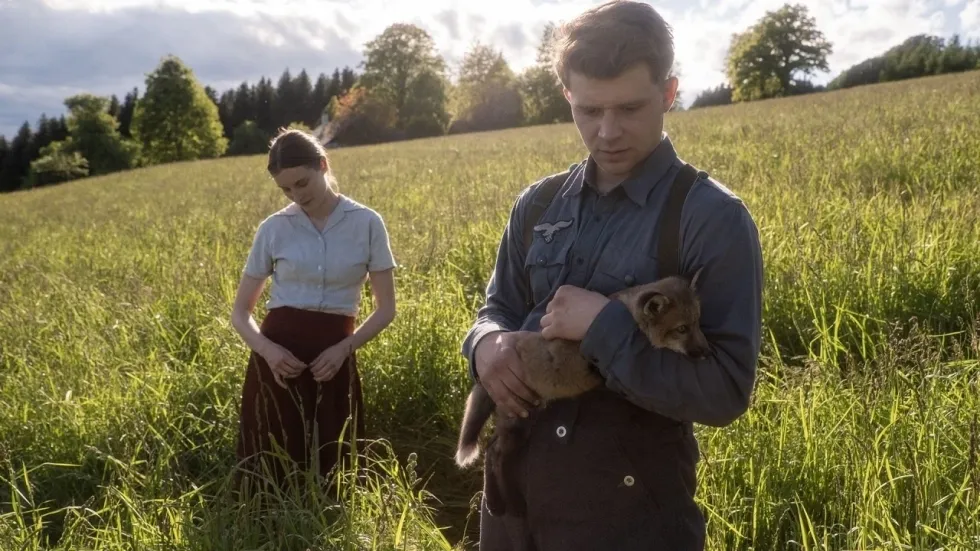How This Austrian Director Told His Great-Grandfather's True War Story
We speak with director Adrian Goiginger about his WWII film, The Fox.

Simon Morzé in The Fox
The Fox is a film that belongs in the class of gorgeous contemporary historical dramas that observe the horrors of war from a new perspective, a phrase that brings to mind movies like Hidden Life and All Quiet on the Western Front. In The Fox, a true story, a young soldier encounters a wounded fox cub and nurses it back to health while moving through occupied France, finally finding a way to face his own traumas in the process.
That soldier was Franz Streitberger, great-grandfather to writer/director Adrian Goiginger. Goiginger tells the story of this introverted soldier with a deft hand, never shying from death and destruction, but finding the moments of humanity and beauty as well.
We had the pleasure of chatting with Goiginger via email. Below, learn about his challenges working with animals, why he was so committed to authenticity, and more.
The Fox | WW2 Drama | Official Trailerwww.youtube.com
Editor's note: The following conversation is lightly edited for clarity.
No Film School: As a filmmaker and storyteller, you pull extensively from your family history. Where did you start as you developed the true story of your great-grandfather?
Adrian Goiginger: My great-grandfather told me his life story when I was a young teenager. I started recording his stories and at the age of 14, I had the dream to make a film about the friendship he had with his fox during wartime. And I never really let the idea go.
After my first feature The Best of All Worlds, I saw an opportunity to actually make this film happen. My great-grandfather was still alive then (he died two weeks shy of his 100th birthday); I was in my mid-20s then, and I asked him a lot of specific questions about his childhood and his war experiences.
He made about 200 pictures in World War II. Those were a huge visual inspiration for me and the DoPs.
I broadened my research and talked to a lot of contemporary witnesses, and I read a lot of unpublished personal diaries and letters that were written from soldiers at that time.
The hard part in writing the script was to decide what I really needed to make the story work. I had enough material to make a five-hour film. After the first draft, I decided that I wasn't gonna make a war movie. It just happens to take place during wartime, but actually, it's a story about forgiveness and the trauma of a young man who is expelled from his family.
NFS: The language in your film is very authentic, and later a commanding officer even comments that he can't understand your protagonist's dialect. Why was it important to include that detail?
Goiginger: Authenticity is one of the most important things for me. Austria is a small country, but it is full of heavy dialects that are difficult to understand for Germans.
Franz Streitberger grew up in the very poor countryside. His father was illiterate, so the way people talk does really characterize them. The higher-ranking officers in the Wehrmacht had a formal education, so they would look down upon my great-grandfather.
Apart from that, Franz was a man of few words. He spoke through his actions, which is always a blessing for a director because you can't get away with transporting too much story through dialogue. I think The Fox would work pretty well as a silent movie, like the original All Quiet on the Western Front.
NFS: The visuals on his motorcycle journey as he passes all the imagery and violence of war were so stunning. What was your process for deciding how all that would look?
Goiginger: Luckily, I was working with two great DoPs, Yoshi Heimrath and Paul Sprinz, with whom I have made feature films before. We watched a lot of films as research, and we were hugely influenced by Son of Saul (hence the 4:3 aspect ratio) and all Terrence Malick movies. I admire Malick's work, especially The Thin Red Line and A Hidden Life.
Franz was a motorcycle courier, so he was not directly involved in acts of war. He mostly passed them and saw the devastation and the death that Hitler's atrocious attacking war on France caused.
But even in this hell on earth, humans seek moments of peace and beauty, that's why I decided that I want to capture the beauty of nature.

NFS: What was the most challenging scene in the project for you to direct, and why?
Goiginger: Apart from the fox scenes, it was difficult for me to direct the scenes with the whole platoon of soldiers. I knew that my leading actors would do a great job because I rehearsed with them for weeks and months, and they saw this film as a huge opportunity.
But then you have about 200 extras that are not prepared properly for the shoot. Nevertheless, they also have to sing, march, drive, and drill. I would have been disappointed in my ability as a director if the audience had seen a difference between the actors and the extras.
There was a real soldier on set who worked as a consultant, and in every little break, he would gather the extras and drill them. Maybe this is a different problem in Germany and Austria, because unfortunately, they are not paid very well.
Editing was crucial for these scenes so that they would blend in nicely with Simon Morzé and the other actors.
NFS: What about the challenge of working with foxes? Can you go into some of those details?
Goiginger: All scenes with the foxes were extremely challenging. I would never do that again. (laughs)
CGI foxes were never an option, so we had to train the foxes for years so that they would not be afraid of people per sé and the leading actor Simon Morzé in particular. We had to do a lot of improvisation on set, because you can't really tell foxes where to go or where to stay.
The whole crew had to deal with this situation, but we had a lot of preparation, so somehow it worked. It was a lot easier to work with the fox cubs, but grown-up foxes can be very stubborn and moody. But we really got to know and like them, and Simon built up relationships with them to make the scenes work.
NFS: What is one piece of advice you wish you'd known before directing your first feature?
Goiginger: I learned my lessons while shooting several short films before I made my first feature. The mistakes I made there were my real film school. After my first feature, I found out that it's important for me to take financial responsibility as a producer as well.
I am not a "do or die" director. I love to find solutions to how to make scenes cheaper but with the same emotional impact. I had full creative freedom in The Fox; that's the way I want to work.
NFS: Anything else to add?
Goiginger: We made an unpolitical film which takes place in a very political time. That was a risk, but it was important for me to show that there are personal stories and traumas behind every uniform. Unfortunately, war never changes, but we have to distinguish between the evil minds that attack countries and kill millions of people and the soldiers that are forced to fight. My great-grandfather was no hero. You can hold that against him, but he also never committed to the ideology of nationalism. He just wanted to survive and be happy.
The Fox is available now on Amazon Prime Video and Apple TV.
- How to Create an Epic War Scene with Dirt, a Tarp, and Some VFX Tricks ›
- How to Film in a War Zone ›
- Defining the War Movie Genre (Free Outline Template) ›
- The Long Road to Embedding in War as an Indie Filmmaker ›











